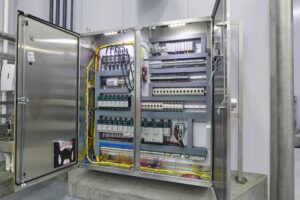When it comes to industrial electrical solutions, meeting production demands with as little downtime as possible is key in just about any industry. Automated processes require well-designed control systems to improve overall efficacy and provide reliable monitoring information about the machines. Here are two control systems that are crucial in running automated processes as efficiently as possible:
Programmable Logic Controllers (PLC)
A PLC is a rugged computer built for industrial needs that monitors inputs and outputs, and makes decisions for automated machines. By reading signals from input devices, such as sensors or keyboards, PLCs can implement automated functions even in harsh environments that would otherwise destroy less resilient devices.
Why are PLCs valuable?
Because their input and output devices are compatible with most industrial controls, PLCs can be adapted for a number of automation tasks. They are most often used for the control of manufacturing processes by using a seamless interface for a number of operations, such as factory assembly lines, amusement rides and even light fixtures. This makes for a versatile tool that can be highly customized to fit production needs.
One of the most valuable features of PLCs is the ability to make adjustments to the operation while still performing monitoring duties and relaying information. In addition, PLCs are highly tolerant of changes in temperature, humidity and vibration, which makes them excellent devices for monitoring processes in the outdoors. Typical PLCs can function in temperatures between 32 – 130 degrees Fahrenheit.
2. Human Machine Interface (HMI)
Put simply, HMI includes any device or software that allows you to interact with a machine. This application presents information to a user about the state of processes and can implement instructions requested by that user.
HMIs may appear in a variety of forms, from touch screens, push buttons and mobile devices. Some real-life examples include smartphones, multi-touch control panels and computer with a keypad.
Why is HMI valuable?
The most valuable part of HMI technology as it relates to industrial needs is the ability to monitor production and respond quickly to ever-evolving production demands. This capability is crucial in improving efficacy and limiting interruptions in workflow.
Beyond productivity enhancements, HMI provides insight into the system’s problems and maintenance needs. Though simple, alarms are a critical function of HMI technology that alert operators to issues within the system that could cause major damage if not immediately fixed.
Get started on your next project with us
Our expert technicians at Prairie Electric provide complete turnkey integration solutions and custom designing industrial controls to meet your specific needs and ensure the efficacy of your systems. We pride ourselves on providing the highest quality, state-of-the-art developments to ensure that your project is completed in an efficient manner and of the highest possible quality.
Our Industrial Automation Controls Department runs on these same principals. What do we handle in this department? The real question is, what don’t we handle?! Automation, also known as automatic control, refers to the use of various types of control systems that operate equipment, including machinery, factory processing, boilers and heat-treating ovens, as well as controls that allow for steering and stabilizing of ships and aircraft, all within minimal intervention by humans. At Prairie Electric, our experience equals your success in all types of automation controls.
The following is a detailed list of the different types of automation controls we build and distribute:
Shipping/ Receiving
Our team assembles and programs all check-weigh systems, pass-fail systems made up on in-line scales, bar-code and/ or RFID readers, and conveyors that sort items, tools essential to your shipping and receiving projects. We can also program a manifest system, which labels outbound order cartons and tracks shipping data, along with your customer billing. Finally, we can program sortation equipment that automatically diverts cartons assigned to the dock floor or floor loading point.
Food Process
Our Industrial Controls department builds the automated controls for FPA ovens, cooling tunnels, wire cuts, dough feed equipment, rotary moulders, laminating and sheeting equipment, and so much more. We’re your one-stop resource for automated food processing controls.
Wine Bottle Handling
Ever see an image of a robotic arms picking wine bottle up off of a conveyor belt? Yep, we make and program those. Automated bottle picking systems are essential for organizing and packing wine or spirits bottles, and can either be mounted or fixed for optimal positioning. We design modular, scalable options to specifically suit your needs.
Conveyor Projects
From the conveyor belt at the grocery store to those used in waste handling, we’ll make sure your items move along at a steady clip. Our team builds the state-of-the-art automation systems behind belt, screw, chain, vibrating, and pneumatic conveyor belts for your convenience.
Infrared Photo Eyes
Commercial and residential protection systems may include the use of photo eyes, safety edges, and other types of sensing mechanisms. Our team programs these eyes for optimal use, so you can protect your building from security threats as well as vehicle blocking of travel paths and other hazards.
We live in an automated world. Businesses and individuals alike depend on the effectiveness of automated controls to share and produce products, travel, and make their daily lives easier. Have questions? Contact us today!


